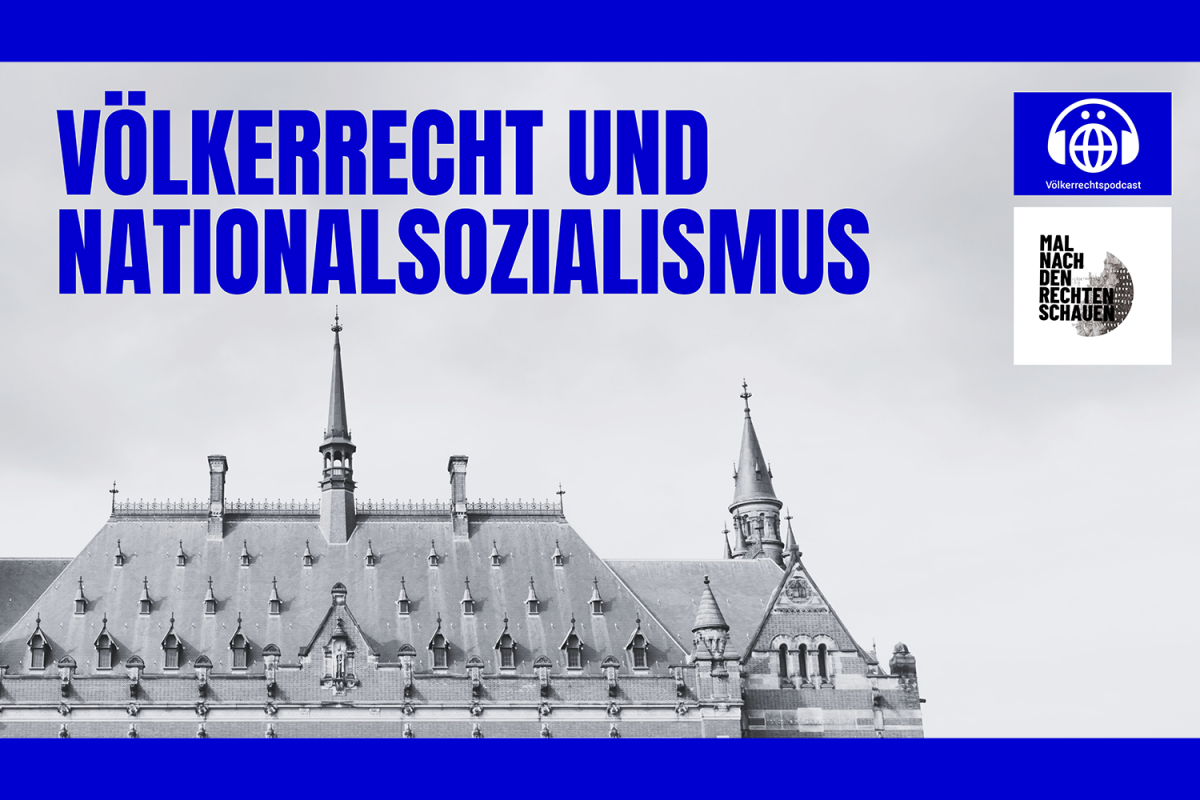Völkerrecht und Nationalsozialismus (Teil I)
Eine Kooperation mit dem Podcast "Mal nach den Rechten schauen"
In welchem Verhältnis stehen das Völkerrecht und Nationalsozialismus zueinander? Welche Völkerrechtler spielten im Nationalsozialismus eine Rolle? Welche Einfallstore für nationalsozialistisches Gedankengut gab es im Völkerrecht? Und wie ging es nach dem Nationalsozialismus damit weiter? Gemeinsam mit dem Podcast „Mal nach den Rechten schauen“ haben wir in dieser Kollaborationsfolge diese Fragen untersucht. Der weitverbreitete Irrglaube, dass das Völkerrecht „das Gute“ darstelle trügt, denn auch das NS-Regime bezog sich auf völkerrechtliche Argumente und Interpretationen. Im ersten Teil dieser Folge haben wir Dr. Felix Lange dabei um Hilfe gebeten und mit ihm die oben angesprochenen Fragen untersucht und diskutiert. Im zweiten Teil dieser Folge gehen wir näher auf einen Artikel zum Humanitären Völkerrecht von Eyal Benvinisti ein, welcher deutlich macht, dass das nationalsozialistische Gedankengut auch noch nach 1945 die Weiterentwicklung des Völkerrechts “beeinflusste”. In beiden Teilen unserer Folge tauchen auch immer wieder die Namen von Carl Schmitt und Hans Kelsen auf – diese beiden Figuren aus dem Völkerrecht werden die Protagonisten unserer zweiten Folge zu Völkerrecht und Nationalsozialismus darstellen, in welcher wir mit Prof. Kreß über die gemeinsame Zeit der beiden an der Universität zu Köln reden werden.
Literatur:
- Benvenisti, Eyal, The Birth and Life of the Definition of Military Objectives, Legal Studies Research Paper Series, Paper No. 4/2022, March 2022.
- Bertschl, Rudolf, Die Völkerrechtslehre des Nationalsozialismus, Rote Revue: sozialistische Monatsschrift 4/19, S. 154-157.
- Diner, Dan, Rassistisches Völkerrecht, Elemente einer nationalsozialistischen Wertordnung, Vierteljahreshefte für Zeitgeschichte 1/37 (1989), S. 23-56.
- Rogge, Hinrich, Hitlers Friedenspolitik und das Völkerrecht, Zeitschrift für die gesamte Staatswissenschaft, 1939, S. 572-576.
- Schmoeckel, Mathias, Die Sumpfblüte des Völkerrechts im NS. Wechselnde Zwecke der Völkerrechtshistoriographie seit dem 16. Jahrhundert, in: Hermann/Lahusen/Ramm/Saar (Hrsg.), Nationalsozialismus und Recht, Zweite und Dritte Babelsberger Gespräche, 2018.
- Lange, Felix, Carl Bilfingers Entnazifizierung und die Entscheidung für Heidelberg, ZaöRV 74 (2014), S. 697-731.
- Lange, Felix, Zwischen völkerrechtlicher Systembildung und Begleitung der deutschen Außenpolitik. Das Max-Planck-Institut für ausländisches öffentliches Recht und Völkerrecht 1945-2002, Forschungsprogramm Geschichte der Max-Planck-Gesellschaft.
Interviewpartner: Dr. Felix Lange von der Kolleg-Forschungsgruppe “International Rule of Law, Rise or Decline”
Autor:innen: Isabel Lischewski, Sophie Schuberth, Viktoria Moissiadis
Viktoria Loukia Moissiadis studiert Jura an der Universität zu Köln und ist Mitglied im Team des Podcasts “Mal nach den Rechten schauen”.

Sophie Schuberth is a research fellow and PhD-candidate at Freie Universität Berlin, working in the Berlin Potsdam Research Group ‘The International Rule of Law- Rise or Decline?’. She is an editor at Völkerrechtsblog.

Erik Tuchtfeld is a research fellow at the Max Planck Institute for Comparative Public Law and International Law (Heidelberg) and head of the humanet3 research group. He is an editor at Völkerrechtsblog.

Philipp Eschenhagen is a research associate at Bucerius Law School and a PhD candidate at the Walther Schücking Institute for International Law. He is an editor at Völkerrechtsblog.


Dr. Isabel Lischewski is an Editor and Podcast Co-Host at Völkerrechtsblog as well as a post-doctoral researcher focusing inter alia on gender, governance, and education in international and German public law at University of Münster.